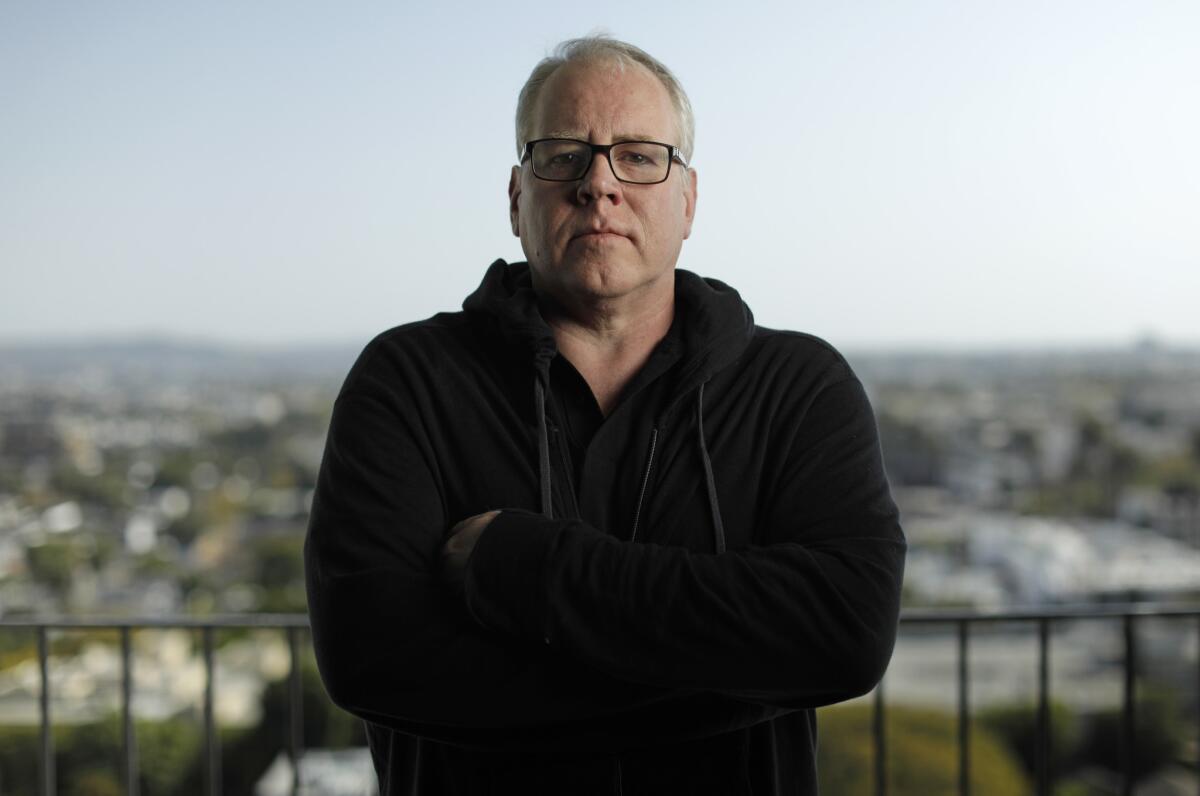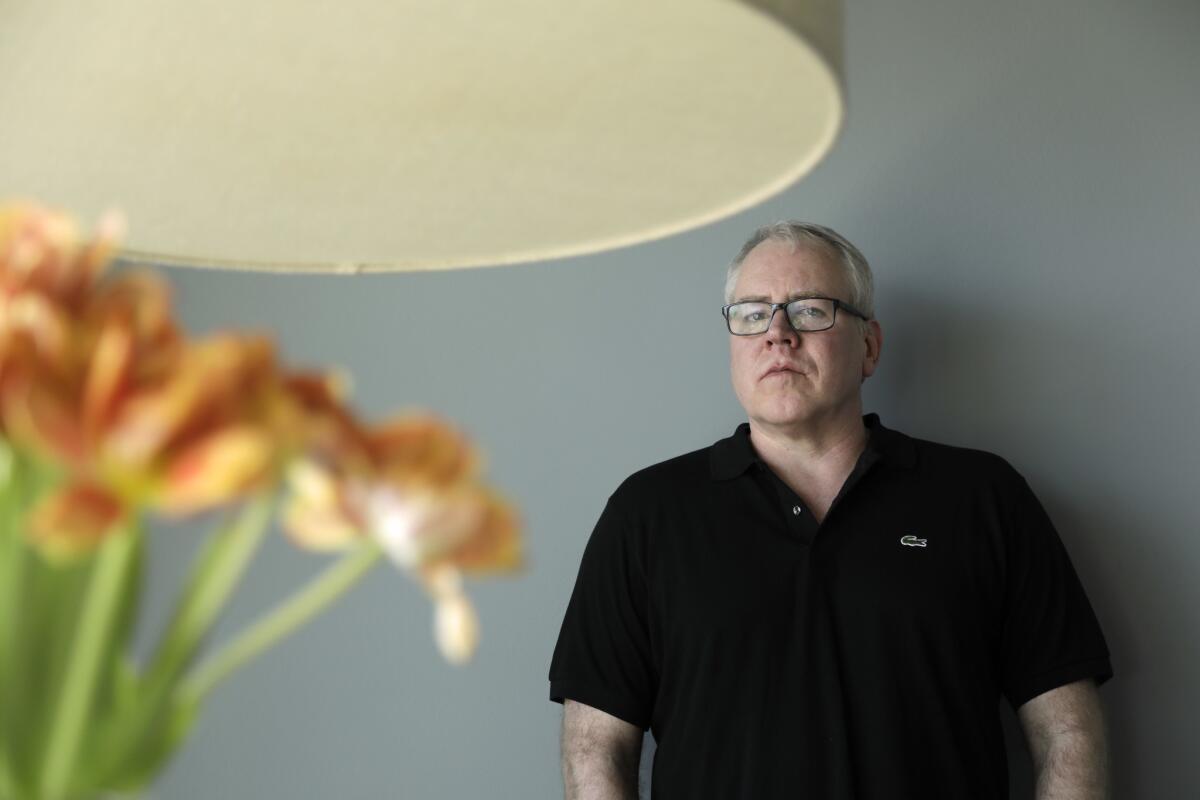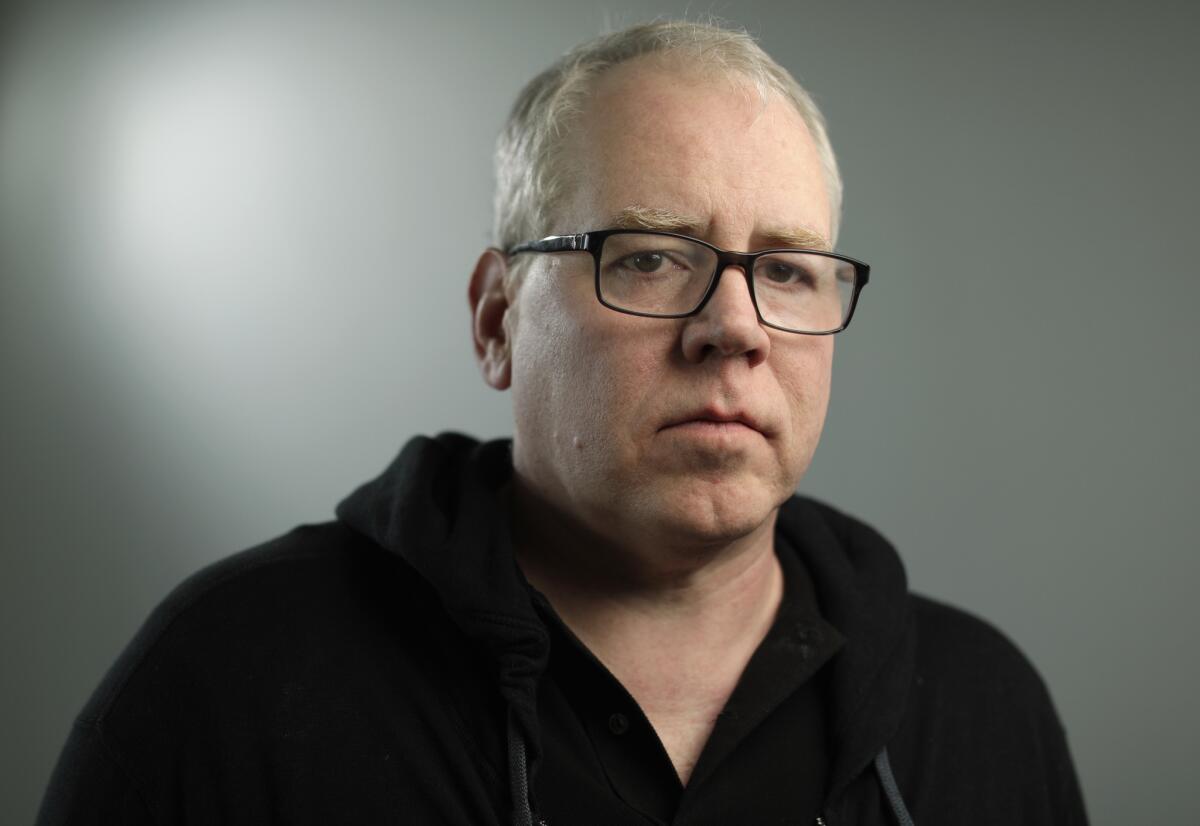Bret Easton Ellis is over today’s Trump obsession — in ‘White’ he finds other targets

- Share via
“Not Donald Trump again,” Evelyn Richards moans about halfway through “American Psycho,” Bret Easton Ellis’ biting satire of the Reagan ‘80s. She’s sick of hearing about the real estate mogul. He seems to be all her fiancé, Patrick Bateman, ever talks about. “Oh, God. Is that why you were acting like such a buffoon? This obsession has got to end!”
It’s not hard to imagine Ellis repeating these exact words today to his “millennial boyfriend” or some Hollywood dinner companion. Like Evelyn Richards, he’s sick of hearing about the real-estate-mogul-cum-reality-TV-star-cum-president. Patrick Bateman’s “hero” has become the left’s bête noire, and Ellis can’t stand what he thinks is a rather unhealthy obsession. “Not Donald Trump again....This obsession has got to end!”

Ellis, admittedly, has his obsessions too — the importance of aesthetics over ideology, the danger of the reputation economy, the need to separate art from artist, neutrality, free speech, millennial whining, corporate fascism, Joan Didion, the horror films of his youth, Richard Gere in “American Gigolo,” etc.—all of which are on display in his new book, “White,” out in April by Knopf.
“White” is Ellis’ first book in almost a decade, since his novel “Imperial Bedrooms” was published in 2010. It’s also his first book of nonfiction — ever — which seems surprising for a guy who loves Didion as much as he does and who has made headlines and riled up social media hordes for his provocative opinions and his unapologetically Gen-X sensibility.
For Ellis, it’s absurd to pretend that we aren’t all products of our generation. It doesn’t erase you as an individual, of course, but there are qualities we share with those born just before us and just after us.
So Ellis represents himself but also, in the words of Fyodor Dostoevsky, “he represents a generation that is still living out its days among us.” One of the first things his “millennial boyfriend” — as Ellis often refers to him in his book and podcast — tells me, when I arrive at their glamorous West Hollywood apartment, is that he doesn’t agree with Ellis that an entire generation can be lumped together. The “millennial boyfriend” then — as if in perfect counterpoint to his own argument — turns back to his video game, which is muted so that he can listen to news about the recently completed Mueller Report, something he’s not too happy about.
Trump does not bother me more than what has been going on with the ‘woke’ left.
— Brett Easton Ellis
It’s as if I’ve walked into some “White” fan fiction, but this isn’t fiction at all. I’m at the book’s ground zero, standing in the midst of the milieu out of which it emerged: a relationship across political, cultural and generational divides, at a time when the country is at its most divided. There’s something endearing about that.
At any rate, it’s good to know that the “millennial boyfriend” that Ellis mentions pretty regularly on his podcast and throughout “White” is a real person rather than some straw man — and that he’s more or less as Ellis sees him: handsome, constantly playing video games, politically engaged, enraged, and maybe more than a little Trump-obsessed.
Ellis and I head back into his office, leaving his boyfriend to his video games. In the office, the windows are open. Southern California’s trademark sunlight streams in. His hair is white as the walls. He wears no shoes. I’m alarmed by how approachable Ellis is. He’s friendly but not so friendly that it feels put on, an act. He often asks what I think about whatever topic we discuss, and he seems, surprisingly, to have genuine interest in my takes.
He likes when I agree with him no more nor less than when I disagree with him. He’s not the angry or whiny caricature some would like to paint him as, but he’s not shy with his opinions either. He’s pleasantly direct.
When I ask him what he would say to critics who believe that in “White” he becomes what he accuses millennials of being — whiny, petulant, uncharitable, intransigent — he tells me that “if someone thinks that I’m whining about being oppressed in this, that’s wrong. I’ve never felt that way at all.” Ultimately, though, he admits that he really doesn’t care about the criticism of the book. People can say what they want.
And his critics have spoken out. He often gets called a racist or a misogynist, labeled a conservative or a Republican, tossed in with the IDW (Intellectual Dark Web) or the alt-right — all of which he finds somewhat puzzling. A longtime friend, he explains, recently told him casually that he felt Ellis was becoming right-wing. “You really have read me wrong” was Ellis’ response. “What do you do about that?” he asks me. Then he shrugs and repeats what becomes a sort of refrain throughout our conversation: “I really don’t care about the reactions anymore.”

The idea that “White” is merely some right-wing anti-political-correctness screed is disingenuous. Yes, he blasts “cancel culture” and has criticisms of Black Lives Matter that are likely to offend, but the book is also a memoir of sorts, if not a straightforward one. We learn about his childhood in the 1970s, watching horror movies and finding his father’s stash of pornography. We read about his relationships with various men and how he fits into the gay community. We get anecdotes about Kanye West and David Foster Wallace, Jean-Michel Basquiat and Judd Nelson. Though Ellis is clearly no fan of political correctness, he admits he’s only really interested in it for the ways in which it exposes corporate fascism (one of the main targets of the book).
What might be most surprising to his fans is that “White” at times comes across as an earnest plea for a recognition of human messiness (“What gets erased are the contradictions inherent in all of us”), a reconciliation with those who hold different beliefs (“But if you look at everything only through the lens of your party or affiliation...doesn’t that make you somewhat uncurious and oversimplifying?”), a repudiation of our corporate overlords (“With fewer and fewer corporations now running the show...fellow comrades might need to adhere to their new rulebook”), and a renaissance of artistic idiosyncrasy (“Weren’t artists supposed to reside anywhere except in risk-allergic safe-houses?”). I confess to him: “It’s weird to hear an earnest plea from you.” “It is,” he purrs. “It is....But, look, it’s not going to work.” He doesn’t even need to give a reason why.
Ellis famously argues for aesthetics over ideology, and I ask if there’s a limit to that for him. “No. Never....Style is really everything. You realize this the older you get — the message doesn’t matter, story and characters don’t matter, it’s how everything is presented.”
There is no such thing as “dangerous art” for Ellis, unless it’s just terrible corporate art, but he even questions if that is truly dangerous.
He often gets called a racist or a misogynist, labeled a conservative or a Republican... or the alt-right — all of which he finds somewhat puzzling.
When I push him on the fact that he seems to go pretty easy on President Trump in “White,” saving his sharpest barbs for the left, he admits: “You’re right, reading the book, you do see me going easier on Trump, though I have nothing in the book to align myself with him or his policies. Trump does not bother me more than what has been going on with the woke left.”
He concedes, “I think part of it has to do with the fact that Trump irritated me in the ’80s. I got my Trump hatred out. I found him very annoying, and I couldn’t believe that all the men that I knew on Wall Street unironically liked him, unironically liked ‘The Art of the Deal’ … Patrick Bateman’s father figure is Trump, and I thought that was kind of a criticism of the values of Trump and of that era. So I think by the time Trump really arrived on the political scene, I had had it already.”
“White” begins by discussing a novel Ellis had been thinking of writing, a novel that never comes to fruition. When I ask why he wrote this book as nonfiction instead of as an “American Psycho” or a “Less Than Zero” for this current climate, he gives a long answer about how he has been moving away from the novel for some time now for various reasons. He’s been writing more than ever before in the last decade, he claims, but it’s for film and TV projects (most of which hasn’t come to fruition) and his podcast.
I still wonder what this book would have looked like as fiction, as satire, as an “American Psycho,” as a “Less Than Zero” — but we will have to keep wondering. That’s just not the book he has in him at this moment. For Ellis’ fans, I’m sure this one will be enough for now — for Ellis’ detractors too.
::
Bret Easton Ellis at the L.A. Times Festival of Books: Ellis appears at 11 a.m. April 14 in conversation with Scott Timberg.
Malone is a writer based in Southern California. His work has appeared in Lapham’s Quarterly, Literary Hub, the LA Review of Books and elsewhere.
More to Read
Sign up for our Book Club newsletter
Get the latest news, events and more from the Los Angeles Times Book Club, and help us get L.A. reading and talking.
You may occasionally receive promotional content from the Los Angeles Times.






